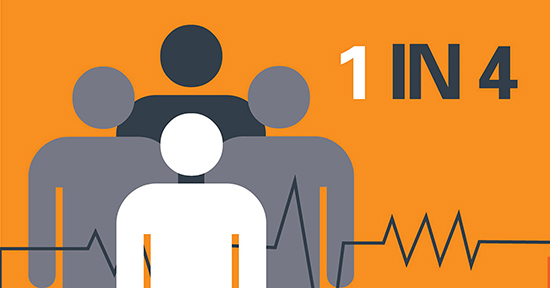The Link Between AFib and Stroke
Learn About the Connection: May Is Stroke Awareness Month
If you are one of the 5.5 million Americans living with atrial fibrillation (AFib) – the most common type of cardiac arrhythmia (abnormal heart rhythm) – you are already at high-risk for stroke.1 May is Stroke Awareness Month, a reminder to make sure you and your loved ones stay heart-smart and know the risks of stroke that come with having AFib.
“Atrial fibrillation not only causes many symptoms and decreases your quality of life, but also increases your stroke risk fivefold or more. Moreover, strokes caused by AFib are more likely to be disabling and life-changing,” according to Dr. Jose Osorio, an international expert on the treatment of AFib and leading electrophysiologist.

According to a 2017 study, AFib is the direct cause of 1 in 4 strokes.2 Yet many people still do not understand the link between AFib and stroke.
People with AFib can have multiple strokes, including silent strokes (strokes that don’t show physical symptoms but show up on a brain scan) that, over time, can cause dementia.3 Likewise, AFib-related strokes are nearly twice as fatal and twice as disabling as non-AFib-related strokes.4
During AFib, rapid or irregular heartbeat may cause your blood to pool in the heart, which can cause clots to form. Once regular heart rhythm is restored, the flow of blood can carry these clots out into the body. These blood clots may eventually reach the brain and cause a stroke.
AFib affects patients differently. Some patients report feeling symptoms, while others experience no symptoms at all. People with AFib are still at risk for a stroke, even if no symptoms are present. Some common symptoms of AFib include:
- General fatigue
- Rapid and irregular heartbeat
- Fluttering or “thumping” in the chest
- Shortness of breath and anxiety
- Weakness, dizziness, faintness or confusion
If you are diagnosed with AFib, you should talk with a heart arrhythmia specialist, known as an electrophysiologist, to see which treatment route is best for you.5 Treatment for AFib is designed to manage abnormal heart rate or rhythm and also reduce the risk of blood clots and stroke.
One of the latest treatments for AFib, catheter ablation, has been associated with a significantly lower risk of stroke.6 Catheter ablation corrects the heart arrhythmia, which then reduces the risk of stroke in patients.
To connect with AFib patients online, visit Get Smart About AFib on Facebook. The online community hosts an event every month with an electrophysiologist for an informative question-and-answer session. To learn more, or to find an electrophysiologist near you, visit GetSmartAboutAFib.com.
Photo courtesy of Getty Images
1 Passman, Rod S. “The Role of Implantable Loop Recorders in Guiding Anticoagulation Therapy in PAF: Anticoagulation ‘Pill-in-the-Pocket?.” American College of Cardiology, www.acc.org/latest-in-cardiology/articles/2015/02/23/08/34/the-role-of-implantable-loop-recorders-in-guiding-anticoagulation-therapy-in-paf.
2 “Atrial Fibrillation and Stroke Information Page.” National Institute of Neurological Disorders and Stroke, U.S. Department of Health and Human Services, www.ninds.nih.gov/Disorders/All-Disorders/Atrial-Fibrillation-and-Stroke-Information-Page.
3 “Atrial Fibrillation and Stroke Information Page.” National Institute of Neurological Disorders and Stroke, U.S. Department of Health and Human Services, www.ninds.nih.gov/Disorders/All-Disorders/Atrial-Fibrillation-and-Stroke-Information-Page.
4“High Blood Pressure, AFib and Your Risk of Stroke.” Heart.org, www.heart.org/en/health-topics/atrial-fibrillation/why-atrial-fibrillation-af-or-afib-matters/high-blood-pressure-afib-and-your-risk-of-stroke.
5“Atrial Fibrillation (AFib) and Clot-Provoked Stroke.” Stop The Clot, National Blood Clot Alliance, www.stoptheclot.org/about-clots/afib-2/.
6 Oketani, Naoya, and Koonlawee Nademanee. “Mortality and Stroke Reduction After Successful Catheter Ablation for High-Risk Patients with Atrial Fibrillation.” Journal, USC Journal, 2008, www.uscjournal.com/articles/mortality-stroke-reduction.
Biosense We





